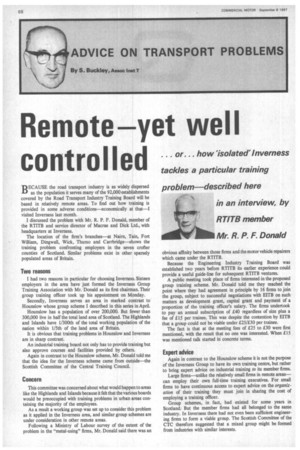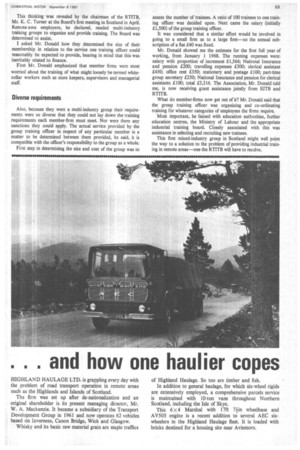Remote yet well control! d
Page 70

Page 71

If you've noticed an error in this article please click here to report it so we can fix it.
BECAUSE the road transport industry is as widely ispersed 1-11 as the population it serves many of the 92,000 establishments covered by the Road Transport Industry Training Board will be based in relatively remote areas. To find out how tr 'ning is provided in some adverse conditions—economically a that—I visited Inverness last month.
I discussed the problem with Mr. R. P. F. Donald, rnmber of the RTITB and service director of Macrae and Dick Ijtd., with headquarters at Inverness.
The location of the firm's branches—at Nairn, Tin, Fort William, Dingwall, Wick, Thurso and Carrbridge—s ows the training problem confronting employers in the seveii crofter counties of Scotland. Similar problems exist in other sparsely populated areas of Britain.
Two reasons I had two reasons in particular for choosing Invernes . Sixteen employers in the area have just formed the Invernes Group Training Association with Mr. Donald as its first chainrian. Their group training officer took up his appointment on Monday.
Secondly, Inverness serves an area in marked c ntrast to Hounslow whose group scheme I described in this serie in April.
Hounslow has a population of over 200,000. But f wer than 300,000 live in half the total land area of Scotland. The ghlands and Islands have 1/300th of the total working populati n of the nation within 1/5th of the land area of Britain.
It is obvious that training problems in Hounslow and nverness are in sharp contrast.
An industrial training board not only has to provide t *ning but also approve courses and facilities provided by others.
Again in contrast to the Hounslow scheme, Mr. Donald told me that the idea for the Inverness scheme came from ou ide—the Scottish Committee of the Central Training Council.
Concern This committee was concerned about what would hap n to areas like the Highlands and Islands because it felt that the vari us boards would be preoccupied with training problems in urban 4reas containing the majority of the employees.
As a result a working group was set up to consider thi problem as it applied in the Inverness area, and similar group schemes are under consideration in other remote areas.
Following a Ministry of Labour survey of the extent of the problem in the "metal-using" firms, Mr. Donald said there was an obvious affinity between those firms and the motor vehicle repairers which came under the RTITB.
Because the Engineering Industry Training Board was established two years before RTITB its earlier experience could provide a useful guide-line for subsequent RTITB ventures. A public meeting took place of firms interested in the proposed group training scheme. Mr. Donald told me they reached the point where they had agreement in principle by 16 firms to join the group, subject to successful negotiations with EITB on such matters as development grant, capital grant and payment of a proportion of the training officer's salary. The firms undertook to pay an annual subscription of £40 regardless of size plus a fee of £15 per trainee. This was despite the contention by EITB that a group could not be viable under £25/£30 per trainee.
The fact is that at the meeting fees of £25 to £30 were first mentioned, with the result that no one was interested. When £15 was mentioned talk started in concrete terms.
Expert advice Again in contrast to the Hounslow scheme it is not the purpose of the Inverness Group to have its own training centre, but rather to bring expert advice on industrial training to its member firms.
Large firms—unlike the relatively small firms in remote areas— can employ their own full-time training executives. For small firms to have continuous access to expert advice on the organization of their training they must join in sharing the cost of employing a training officer.
Group schemes, in fact, had existed for some years in Scotland: But the member firms had all belonged to the same industry. In Inverness there had not even been sufficient engineering firms to form a viable group. The Scottish Committee of the CTC therefore suggested that a mixed group might be formed from industries with similar interests. This thinking was revealed by the chairman of the RTITB, Mr. K. C. Turner at the Board's first meeting in Scotland in April. Remote-area employers, he declared, needed multi-industry training groups to organize and provide training. The Board was determined to assist.
I asked Mr. Donald how they determined the size of their membership in relation to the service one training officer could reasonably be expected to provide, bearing in mind that this was inevitably related to finance.
First Mr. Donald emphasized that member firms were most worried about the training of what might loosely be termed whitecollar workers such as store keepers, supervisors and managerial staff.
Diverse requirements
Also, because they were a multi-industry group their requirements were so diverse that they could not lay down the training requirements each member-firm must meet. Nor were there any sanctions they could apply. The actual service provided by the group training officer in respect of any particular member is a matter to be determined between them provided, he said, it is compatible with the officer's responsibility to the group as a whole.
First step in determining the size and cost of the group was to assess the number of trainees. A ratio of 100 trainees to one training officer was decided upon. Next came the salary (initially £1,500) of the group training officer.
It was considered that a similar effort would be involved in going to a small firm as to a large firm—so the annual subscription of a flat £40 was fixed.
Mr. Donald showed me the estimate for the first full year of working, from January 1 1968. The running expenses were: salary with proportion of increment £1,566; National Insurance and pension £200; travelling expenses £300; clerical assistant £450; office rent £350; stationery and postage £100; part-time group secretary £250; National Insurance and pension for clerical assistants £100; total £3,316. The Association, Mr. Donald told me, is now receiving grant assistance jointly from EITB and RTITB.
What do member-firms now get out of it? Mr. Donald said that the group training officer was organizing and co-ordinating training for whatever categories of employees the firms require.
Most important, he liaised with education authorities, further education centres, the Ministry of Labour and the appropriate industrial training board. Closely associated with this was assistance in selecting and recruiting new trainees.
This first mixed-industry group in Scotland might well point the way to a solution to the problem of providing industrial training in remote areas—one the RTITB will have to resolve.




















































































































